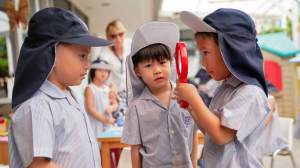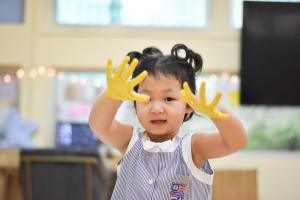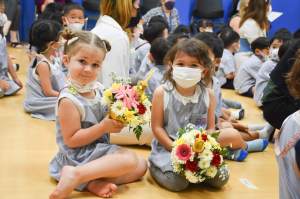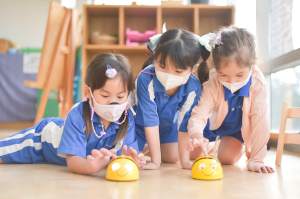St. Andrews Dusit is a British International Nursery school, set just outside the grounds of Chitralada Palace in Bangkok. The small size school is famous and known for being a legendary school, firstly operating in 2010 with its first class of 5 students.
The school is popular among both Thai and expat families, who are located in both the Neighboring Ari area, as well as in other locations across Bangkok. What makes our British international nursery in Bangkok so unique is we offer a hands-on British Early Years Foundation Stage (EYFS) which is a standard followed by the British Education System. Students received great learning support with an impressive teacher to student ratio of 1:4.
The International Nursery Program in Bangkok offers a chance for different cultures to meet and learn from one another. Even though the school is essentially a British Nursery in Bangkok, St. Andrews also have activities related to various cultures of the world. For example, during International Week, Nursery students are grouped in different countries, where they learn about that particular country, their people and culture for the entire week. This allows Early Years students to learn about accepting cultural differences within the community.
What to Expect For Dusit Nursery Classes:
In Nursery our goal is to create a safe and stimulating environment for young children to begin exploring the world around them through play, exploration and investigation. We do this by following the children’s interests and providing developmentally appropriate continuous provision activities that support the development and growth in accordance with the EYFS Development Matters curriculum. Our team of Nursery teachers and teaching assistants facilitate this through differentiation, making learning purposeful and exciting, drawing on the children’s interests and building upon their existing knowledge and skills. Our team of housekeepers work with teaching staff and parents by supporting the children in becoming more independent in selfcare such as with toilet training, feeding themselves during snack and lunchtime, expressing preferences at lunchtime by choosing which dishes they want to eat and by supporting children in serving themselves.
Our International Nursery School Gives Children Autonomy Through Free Flow Play
We give children greater autonomy within Nursery, encouraging the child to make choices and express their preferences and embrace what makes them unique with teachers and teaching assistants supporting the child as they do so. Free flow play allows children access to the entire Nursery setting, providing opportunities to explore activities and provision we have set up the classrooms, engage in play in the indoor shared area and soft play area and our outdoors area and sandpit. In each area of our setting, we have put different activities and challenges for children to interact with, which develop different skills outlined across the seven areas of the curriculum. These skills will become the foundations that other skills are built upon as the child progresses through their time at school.
How Dusit’s International Nursery in Bangkok Offers Warm Culture of Care and Outdoor Learning
What’s also different about Dusit Nursery versus the other schools in Bangkok is our warm culture of care. As the students grow and develop, we often see the progress and track the changes to accommodate the developmental learning. The Dusit Nursery classes lets the students use their imagination while playing and exploring, as we believe learning both in and outside the classrooms are critical for a child’s understanding of the world. It is believed globally, not only in the British curriculum, that Outdoor Learning enhances the students’ ability to grow both physically and emotionally.
Nursery Playgroups for Toddlers
St. Andrews Dusit offers 3 Nursery classes in total. To introduce younger children to the learning environment, we offer weekday Playgroups, allowing parents to bring their children to play with other children, with the supervision of our Nursery Teacher. During the playgroups, the children can play with various learning toys and tools, with each other or by themselves, helping them to get used to idea of group play and also sharing. There is also a session for outdoor play, with time spent in the playground and grass field. The Playgroup is part of Nursery program where parents can also get useful tips from our teachers on their child’s development. After getting more accustomed to their surroundings, the children are able to feel more comfortable, and adjusting themselves for the beginning of their school journey.
Nutrition and Sleep for Healthy and Happy Children
Two other important topics parents often ask about our top British International Nursery program is about nutrition and sleep. For nutrition, our healthy and versatile meals and snacks are served. The food is made fresh daily at the canteen, sealed and delivered to classrooms. We believe that eating varieties of the 5 food groups are essential for body growth. There are also vegan options offered, as well as specially prepared meals for students with specific food allergies. In terms of sleep, the students take naps during designated times throughout the day. This is also a key factor in the physical and emotional wellbeing of the students. Teachers, teaching assistant and dedicated maid staff help the children to sleep and reenergize themselves for the rest of the day. Many of our parents often enquire about the children’s eating and sleeping habits, an important sign of a healthy and happy child.
Curriculum:
All of the areas of learning and development from the Development Matters curriculum are important and inter-connected, forming the foundations for other skills and learning to be built upon as the child progresses through primary and secondary school, and into adult life. From these seven areas of the curriculum, we, like other British Nurseries, focus on three Prime areas. These areas have been identified as being particularly crucial for capturing children’s curiosity and enthusiasm for learning, and for building upon their capacity to learn, form relationships and thrive.
The 3 Prime areas are:
– Communication and language: By following the children’s interests and commenting on what they are interested in or engaging with, and echoing back what they say, adding in additional new vocabulary, our Nursery practitioners build upon the children’s existing language knowledge effectively, while building their confidence.
– Physical development: Gross and fine motor skills develop gradually throughout early childhood. This starts with sensory exploration and the development of a child’s coordination, positional awareness and strength. Manipulating different materials and resources, fitting blocks or bricks together, and eventually supporting themselves in getting dressed, putting their shoes on and feeding themselves provides opportunity for physical development which enables children to pursue happy, healthy and active lives.
– Personal, social and emotional development: Fundamental to their cognitive development, PSED is vital for children to lead lives that are healthy and happy. Supporting this development creates attachments that are important for shaping their social world. Positive relationships with familiar adults provide children with understanding of their own feelings and emotions, and those of others.
Our teachers and teaching assistants in the Nursery also focus on three characteristics of effective learning (CoEL) and reflect these in their practice. The Characteristics of Effective Learning describe behaviours children use in order to learn.
The 3 CoEL are:
– Playing and exploring: Children investigate and experience things, and try new activities and develop new skills.
– Active learning: Children concentrate on an activity or task for a period of time, and keep on trying if they encounter difficulties, and celebrate their achievements.
– Creating and thinking critically: Children develop and make links between simple concepts and ideas, and go onto develop strategies for doing things.
Throughout a child’s time in Nursery, we will work with parents, families and the child’s care circle in assisting the child in acquiring the skills which will allow them to become more independent in selfcare. When the child is developmentally ready, we will work together to come up with strategies in supporting the child in toilet training, helping them transition from wearing nappies to recognizing when they need to go and support in using the toilet. Snack and lunchtime are important moments during our daily timetable as we use this time to continue to support the children in becoming independent in their own selfcare. We will help the children to develop the physical skills and coordination required to feed themselves, as well as create a safe and comfortable environment where they feel confident in expressing their personal choices and preferences with food. This self-assurance in communicating personal choices are extended through to their play and their interactions with classmates, friends and staff.
Our British International Nursery Promotes Language and Communication Skills
We encourage children to communicate verbally, using their words to tell people how they feel and if they like or dislike something. These language and communication skills become purposeful when children are playing together and are learning the concept of sharing toys and ideas and listening to one another. Our Nursery team will model these expectations, and elicit responses to support the child in achieving this. We use role play and circle time to explore these themes, and utilize the EYFS curriculum in doing so.
This is just a brief explanation of the developmental learning for our Nursery classes offered by St. Andrews International School Dusit. We are more than welcome to speak with you more in detail.
If you are interested to learn more about our top British International Nursery classes, please kindly book a school tour with our admissions team today.
Admission Enquiry: dusit@standrews-schools.com
Website: www.standrewsdusit.com
Tel: 02 668 6231





